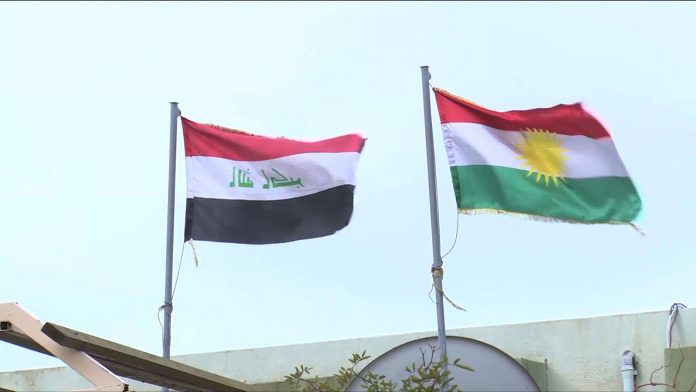Iraqi Finance Minister Taif Sami suspended funding to Kurdistan Region, claiming budget allocation exceeded by $10.34 billion. Kurdish factions condemned the decision as unconstitutional collective punishment against civil servants, while major party KDP threatens serious action if salaries aren’t paid by June 6, potentially destabilizing Iraq’s governing coalition.
Finance Ministry Cuts Kurdistan Region Funding Over Budget Dispute
The crisis erupted when Iraqi Finance Minister Taif Sami informed the Kurdistan Regional Government (KRG) that Baghdad could no longer finance the autonomous region’s operations. In an official letter delivered Wednesday, Sami claimed the Kurdistan Region exceeded its constitutionally mandated 12.67 percent share of the federal budget by 13.547 trillion dinars ($10.34 billion) under the 2025 Federal Budget Law.
The minister cited Iraq’s Federal Supreme Court decisions prohibiting additional funding when budget allocations are exceeded. Crucially, the federal government was expected to distribute May salaries to Kurdistan Region civil servants before the Muslim holiday of Eid al-Adha on June 6, but this process has effectively halted.
Sami’s calculations revealed that the Kurdistan Region’s oil and non-oil revenues from 2023 through April 2024 totaled 19.9 trillion dinars ($15.19 billion), yet only 598.5 billion dinars ($456.87 million) was transferred to Baghdad. This massive discrepancy between collected revenues and federal transfers lies at the heart of the current impasse.
The Kurdistan Regional Government’s finance ministry strongly disputed these calculations Thursday, arguing that Sami’s approach violates the Iraqi Constitution. “Determining the Kurdistan Region’s share must be based on collected federal revenues, not actual expenditures,” the KRG ministry stated, challenging the legal foundation of Baghdad’s decision.
Kurdish Political Factions Unite Against Federal Government Decision
All major Kurdish parliamentary factions condemned the finance ministry’s action in an unprecedented joint statement. The Kurdistan Democratic Party (KDP), Patriotic Union of Kurdistan (PUK), New Generation, Kurdistan Islamic Union (KIU), and Justice Group (Komal) described the decision as politically motivated and constitutionally violative.
These factions called upon Prime Minister Mohammed Shia al-Sudani to intervene immediately, emphasizing that salary payments represent constitutional rights rather than federal favors. They warned that continued delays constitute collective punishment against public sector employees throughout the Kurdistan Region.
Narmin Maarouf, a Finance Committee member in the Iraqi Parliament, criticized Minister Sami’s methodology as “illegal” and lacking constitutional basis. Maarouf noted that despite extensive discussions regarding employee salaries, the minister maintained her position that Kurdistan’s budget allocation was exhausted. She emphasized that the federal budget tables haven’t been submitted to Parliament, describing Sami’s letter as conflicting with three-year budget law provisions.
The Finance Committee pledged to implement “all constitutional and parliamentary measures” to resolve the crisis, indicating potential legislative intervention in the executive branch dispute.
KDP Issues Ultimatum Threatening Coalition Stability
The Kurdistan Democratic Party escalated tensions Thursday by issuing a sharply worded ultimatum to the federal government. The KDP, which represents the Kurdistan Region’s strongest political force, warned of taking “serious stance” if Baghdad fails to release financial entitlements by June 6.
This threat carries significant implications for Iraq’s governing stability. The KDP serves as a crucial member of the State Administration Coalition, which includes the Shiite-led Coordination Framework, Sunni Sovereignty Alliance, and Patriotic Union of Kurdistan. This coalition, formed in September 2022 with Mohammed Shia al-Sudani’s nomination as prime minister, controls 275 of 329 parliamentary seats.
Kurdish parties initially joined the coalition after securing commitments regarding implementing the Oil and Gas Law, ensuring timely financial payments, recognizing constitutional rights, and protecting disputed territories like Kirkuk. The current crisis directly challenges these foundational agreements.
Shakhawan Abdullah, Iraq’s Deputy Parliament Speaker and KDP member, suggested it was time for Kurds to withdraw from the Iraqi government entirely. Such a move would fundamentally alter Iraq’s political landscape and potentially collapse the current governing arrangement.
Oil Revenue Disputes Complicate Federal-Regional Relations
The salary crisis intersects with broader disputes over energy deals worth $110 billion that the KRG recently signed with American companies HKN Energy and WesternZagros. Baghdad immediately rejected these agreements as constitutional violations, insisting all oil investments must proceed through federal channels.
A senior Iraqi oil ministry source confirmed to Rudaw English that both sides are engaging in “serious talks” to resolve the energy dispute, which “must be resolved” to establish cooperation frameworks. However, the source acknowledged that contract signings surprised Baghdad, which views them as unconstitutional regardless of their basis in pre-existing agreements.
The federal oil ministry filed lawsuits against both American companies, with parliament member Basim al-Ghraibawi confirming legal action in commercial courts. The ministry plans additional Federal Supreme Court cases to halt contracts and pursue administrative measures against the KRG.
Oil exports from Kurdistan through the Iraq-Turkey pipeline have remained suspended since March 2023 following a Paris arbitration court ruling favoring Baghdad. The court determined that Ankara violated a 1973 pipeline agreement by permitting independent Kurdish oil exports.
Iraq’s Federal Supreme Court ruled in February that the KRG must transfer all oil and non-oil revenues to Baghdad. The KRG subsequently expressed readiness to hand over non-oil income to comply with federal budget law and prevent funding obstacles.
International Support and Regional Implications
The crisis unfolds against a backdrop of strong American support for Kurdistan Region energy independence. US Secretary of State Marco Rubio recently urged Baghdad to respect the Kurdistan Region’s “economic lifeline” following meetings with both KRG Prime Minister Masrour Barzani and KRI President Nechirvan Barzani.
Rubio emphasized that cooperation between the United States and Iraqi Kurdistan contributes to regional stability, while bilateral economic partnerships benefit both American and Iraqi peoples. State Department spokesperson Tammy Bruce welcomed these discussions, noting Rubio’s commendation of Kurdish partnerships with US companies.
The current standoff represents the latest chapter in complex federal-regional dynamics that have persisted since Iraq’s 2005 constitution established the Kurdistan Region’s autonomous status. With Iraq paying only four months of KRG civil servant salaries this year, resolution appears increasingly urgent for maintaining both regional stability and Iraq’s fragile political coalition.


